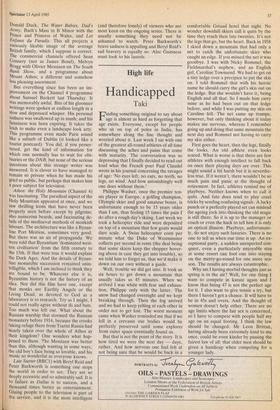High life
Handicapped
Taki
vinding something original to say about
age is almost as hard as forgetting that age exists. Everyone, except for people who sit on top of poles in India, has somewhere along the line thought and worried about it. Last week I sat with one of the greatest all-round athletes of all time discussing the aches and pains that come with maturity. The conversation was so depressing that I finally decided to read out loud what the French poet Paul Claudel wrote in his journal concerning the ravages of age: 'No eyes left, no ears, no teeth, no legs, no wind. And how astonishingly well one does without them.'
Philippe Washer, once the premier ten- nis player in Europe, a golfing champion, Olympic skier and good amateur boxer, is unfortunate enough to be 15 years older than I am, thus feeling 15 times the pain I do after a rough day's skiing. Last week we took a helicopter ride and were deposited on top of a mountain that few goats would dare scale. A Swiss helecopter costs per minute what the Duke of Westminster collects per second in rents (the deal being that some skiers keep the chopper hover- ing above in case they get into trouble), so we told him to forget us, that we'd make it down on our own without a guide.
Well, trouble we did get into. It took us six hours to get down a mountain that usually takes us 45 minutes. When we arrived I was white with fear and exhaus- tion, Philippe only with the latter. The snow had changed overnight and we kept breaking through. Then the fog arrived and we had to keep yelling at each other in order not to get lost. The worst moment came when Washer reminded me that if we fell in a crevasse our bodies would be perfectly preserved until some explorer from outer space eventually found us.
But that is not the point of the story. It is how tired we were the next day — days, rather. And how nervous one had felt at not being sure that he would be back in a comfortable Gstaad hotel that night. No wonder downhill skiers call it quits by the time they reach their late twenties. It's not the legs that go, but the heart. Back in 1958 I skied down a mountain that had only a net to catch the unfortunate skier who caught an edge. If you missed the net it was goodbye. I was with Nicky Rommel, the Fieldmarshal's nephew, and an English girl, Caroline Townsend. We had to get on a tiny ledge over a precipice to put the skis on. I told Rommel that with his heroic name he should carry the girl's skis out on the ledge. But she wouldn't have it, being English and all that. So I made him carry mine as he had been out on that ledge before, and while I was putting my skis on Caroline fell. The net came up trumps, however, but only thinking about it today makes me nervous, whereas I remember going up and doing that same mountain the next day and Rommel not having to carry my skis either.
First goes the heart, then the legs, finally the looks. An old athlete even looks scared. What is worse is that there are few athletes with enough intellect to fall back on once their playing days are over. This might sound a bit harsh but it is neverthe- less true. If it weren't, there wouldn't be so much pain and panic at the thought of retirement. In fact, athletes remind me of playboys. Neither knows when to call it quits. And fate does tend to play cruel tricks by sending confusing signals. A lucky punch or a perfectly played set can mislead the ageing jock into thinking the old magic is still there. So it is up to the manager or coach or even the hack to tell him it is only an optical illusion. Playboys, unfortunate- ly, do not enjoy such luxuries. There is no one to tell us when our time is up. An ex- ceptional party, a sudden unexpected con- quest, even a particularly enjoyable stay at some resort can fool one into staying on the merry-go-round for one more sea- son. The results are always catastrophic.
Why am I having morbid thoughts just as spring is in the air? Well, for one thing I want to compete in karate again and I know that being 47 is not the perfect age for it. I also want to give tennis a try, but there I haven't got a chance. It will have to be in 45s and overs. And the thought of women doesn't help either. There are no age limits where the fair sex is concerned, so I have to compete with people half my age on an equal footing. I think the law should be changed. Mr Leon Brittan, having already been extremely kind to me once, could be even kinder by passing the fairest law of all: that older men should be given a handicap when competing for a younger lady.














































 Previous page
Previous page